定语从句详解+例句
(完整版)定语从句语法详解
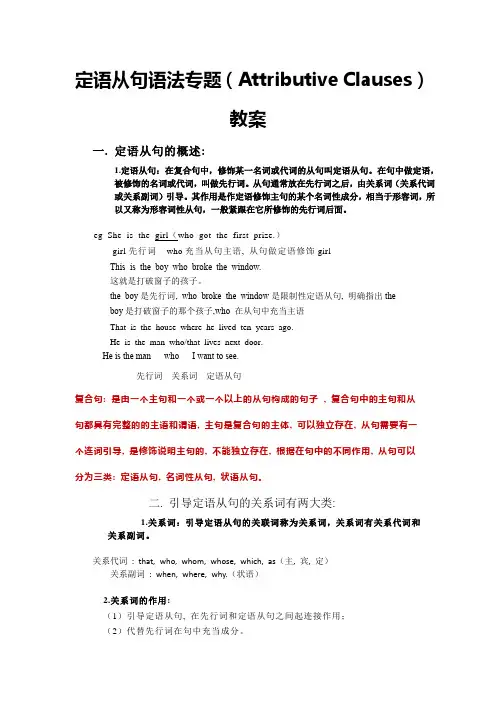
定语从句语法专题(Attributive Clauses)教案一. 定语从句的概述:1.定语从句:在复合句中,修饰某一名词或代词的从句叫定语从句。
在句中做定语,被修饰的名词或代词,叫做先行词。
从句通常放在先行词之后,由关系词(关系代词或关系副词)引导。
其作用是作定语修饰主句的某个名词性成分,相当于形容词,所以又称为形容词性从句,一般紧跟在它所修饰的先行词后面。
eg She is the girl(who got the first prize.)girl先行词who充当从句主语, 从句做定语修饰girlThis is the boy who broke the window.这就是打破窗子的孩子。
the boy是先行词, who broke the window是限制性定语从句, 明确指出theboy是打破窗子的那个孩子,who 在从句中充当主语That is the house where he lived ten years ago.He is the man who/that lives next door.He is the man who I want to see.先行词关系词定语从句复合句: 是由一个主句和一个或一个以上的从句构成的句子, 复合句中的主句和从句都具有完整的的主语和谓语, 主句是复合句的主体, 可以独立存在, 从句需要有一个连词引导, 是修饰说明主句的, 不能独立存在, 根据在句中的不同作用, 从句可以分为三类: 定语从句, 名词性从句, 状语从句。
二. 引导定语从句的关系词有两大类:1.关系词:引导定语从句的关联词称为关系词,关系词有关系代词和关系副词。
关系代词: that, who, whom, whose, which, as(主, 宾, 定)关系副词: when, where, why.(状语)2.关系词的作用:(1)引导定语从句, 在先行词和定语从句之间起连接作用;(2)代替先行词在句中充当成分。
定语从句讲解(完整版)
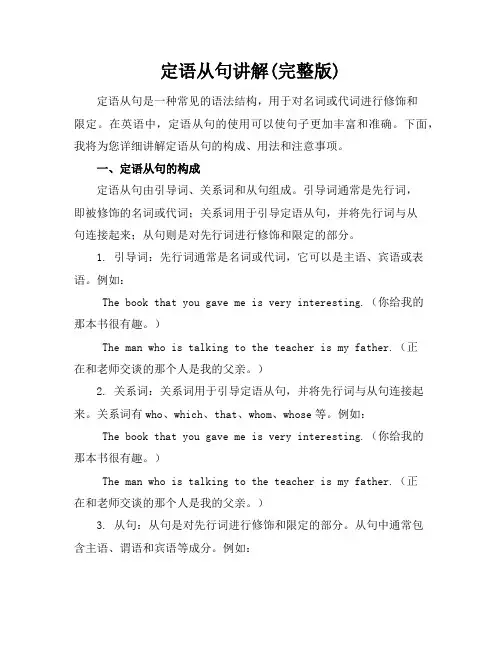
定语从句讲解(完整版)定语从句是一种常见的语法结构,用于对名词或代词进行修饰和限定。
在英语中,定语从句的使用可以使句子更加丰富和准确。
下面,我将为您详细讲解定语从句的构成、用法和注意事项。
一、定语从句的构成定语从句由引导词、关系词和从句组成。
引导词通常是先行词,即被修饰的名词或代词;关系词用于引导定语从句,并将先行词与从句连接起来;从句则是对先行词进行修饰和限定的部分。
1. 引导词:先行词通常是名词或代词,它可以是主语、宾语或表语。
例如:The book that you gave me is very interesting.(你给我的那本书很有趣。
)The man who is talking to the teacher is my father.(正在和老师交谈的那个人是我的父亲。
)2. 关系词:关系词用于引导定语从句,并将先行词与从句连接起来。
关系词有who、which、that、whom、whose等。
例如: The book that you gave me is very interesting.(你给我的那本书很有趣。
)The man who is talking to the teacher is my father.(正在和老师交谈的那个人是我的父亲。
)3. 从句:从句是对先行词进行修饰和限定的部分。
从句中通常包含主语、谓语和宾语等成分。
例如:那本书很有趣。
)The man who is talking to the teacher is my father.(正在和老师交谈的那个人是我的父亲。
)二、定语从句的用法1. 限定性定语从句:限定性定语从句对先行词起到限定作用,即只有满足定语从句条件的名词或代词才是先行词的准确含义。
限定性定语从句通常紧跟在先行词之后,且不能用逗号与主句隔开。
例如: The book that you gave me is very interesting.(你给我的那本书很有趣。
定语从句例句带翻译及讲解
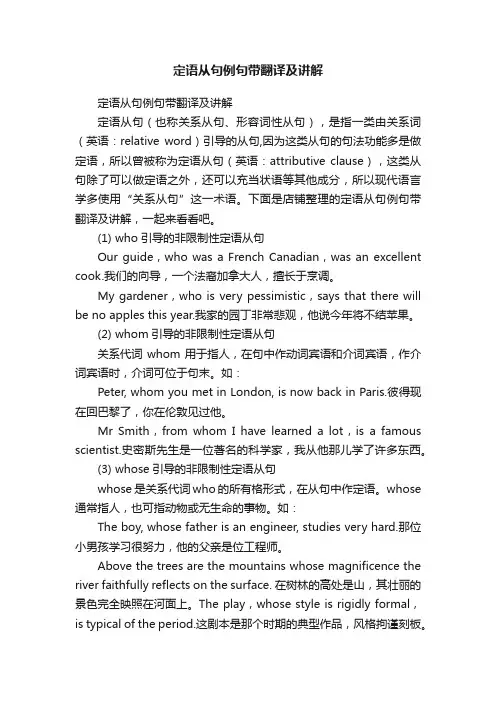
定语从句例句带翻译及讲解定语从句例句带翻译及讲解定语从句(也称关系从句、形容词性从句),是指一类由关系词(英语:relative word)引导的从句,因为这类从句的句法功能多是做定语,所以曾被称为定语从句(英语:attributive clause),这类从句除了可以做定语之外,还可以充当状语等其他成分,所以现代语言学多使用“关系从句”这一术语。
下面是店铺整理的定语从句例句带翻译及讲解,一起来看看吧。
(1) who引导的非限制性定语从句Our guide,who was a French Canadian,was an excellent cook.我们的向导,一个法裔加拿大人,擅长于烹调。
My gardener,who is very pessimistic,says that there will be no apples this year.我家的园丁非常悲观,他说今年将不结苹果。
(2) whom引导的非限制性定语从句关系代词whom用于指人,在句中作动词宾语和介词宾语,作介词宾语时,介词可位于句末。
如:Peter, whom you met in London, is now back in Paris.彼得现在回巴黎了,你在伦敦见过他。
Mr Smith,from whom I have learned a lot,is a famous scientist.史密斯先生是一位著名的科学家,我从他那儿学了许多东西。
(3) whose引导的非限制性定语从句whose是关系代词who的所有格形式,在从句中作定语。
whose 通常指人,也可指动物或无生命的事物。
如:The boy, whose father is an engineer, studies very hard.那位小男孩学习很努力,他的父亲是位工程师。
Above the trees are the mountains whose magnificence the river faithfully reflects on the surface. 在树林的高处是山,其壮丽的景色完全映照在河面上。
考研英语【定语从句】典型例句剖
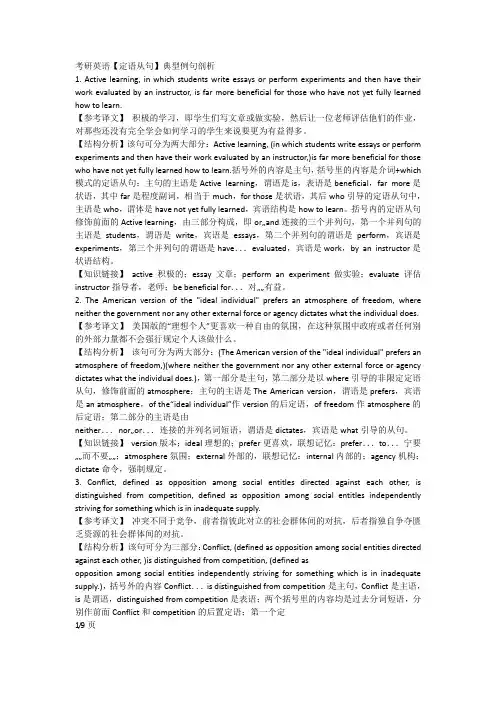
考研英语【定语从句】典型例句剖析1. Active learning, in which students write essays or perform experiments and then have their work evaluated by an instructor, is far more beneficial for those who have not yet fully learned how to learn.【参考译文】积极的学习,即学生们写文章或做实验,然后让一位老师评估他们的作业,对那些还没有完全学会如何学习的学生来说要更为有益得多。
【结构分析】该句可分为两大部分:Active learning, (in which students write essays or perform experiments and then have their work evaluated by an instructor,)is far more beneficial for those who have not yet fully learned how to learn.括号外的内容是主句,括号里的内容是介词+which 模式的定语从句;主句的主语是Active learning,谓语是is,表语是beneficial,far more是状语,其中far是程度副词,相当于much,for those是状语,其后who引导的定语从句中,主语是who,谓体是have not yet fully learned,宾语结构是how to learn。
括号内的定语从句修饰前面的Active learning,由三部分构成,即or…and连接的三个并列句,第一个并列句的主语是students,谓语是write,宾语是essays,第二个并列句的谓语是perform,宾语是experiments,第三个并列句的谓语是have...evaluated,宾语是work,by an instructor是状语结构。
高中定语从句超详细讲解+例句
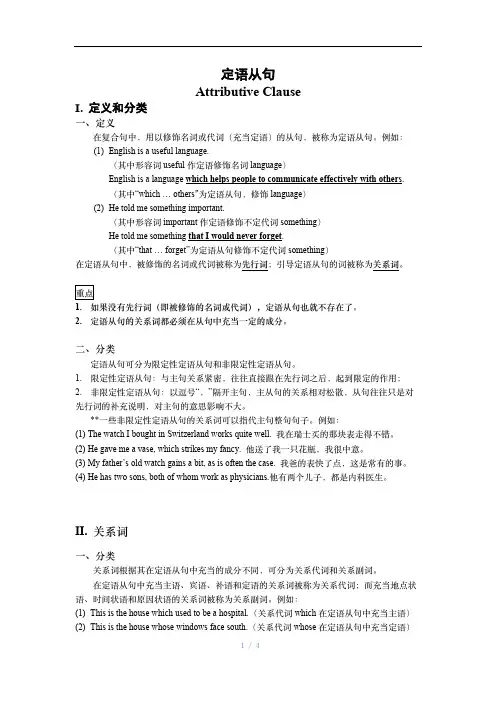
!"#$%Attributive ClauseI. !"#$%&⼀、定义在复合句中,⽤以修饰名词或代词(充当定语)的从句,被称为定语从句。
例如:(1)English is a useful language.(其中形容词useful作定语修饰名词language)English is a language which helps people to communicate effectively with others.(其中“which … others”为定语从句,修饰language)(2)He told me something important.(其中形容词important作定语修饰不定代词something)He told me something that I would never forget.(其中“that … forget”为定语从句修饰不定代词something)在定语从句中,被修饰的名词或代词被称为先⾏词;引导定语从句的词被称为关系词。
重点1.如果没有先⾏词(即被修饰的名词或代词),定语从句也就不存在了。
2.定语从句的关系词都必须在从句中充当⼀定的成分。
⼆、分类定语从句可分为限定性定语从句和⾮限定性定语从句。
1. 限定性定语从句:与主句关系紧密,往往直接跟在先⾏词之后,起到限定的作⽤;2. ⾮限定性定语从句:以逗号“,”隔开主句,主从句的关系相对松散,从句往往只是对先⾏词的补充说明,对主句的意思影响不⼤。
**⼀些⾮限定性定语从句的关系词可以指代主句整句句⼦。
例如:(1) The watch I bought in Switzerland works quite well. 我在瑞⼠买的那块表⾛得不错。
(2) He gave me a vase, which strikes my fancy. 他送了我⼀只花瓶,我很中意。
(3) My father’s old watch gains a bit, as is often the case. 我爸的表快了点,这是常有的事。
定语从句讲解+例句例题
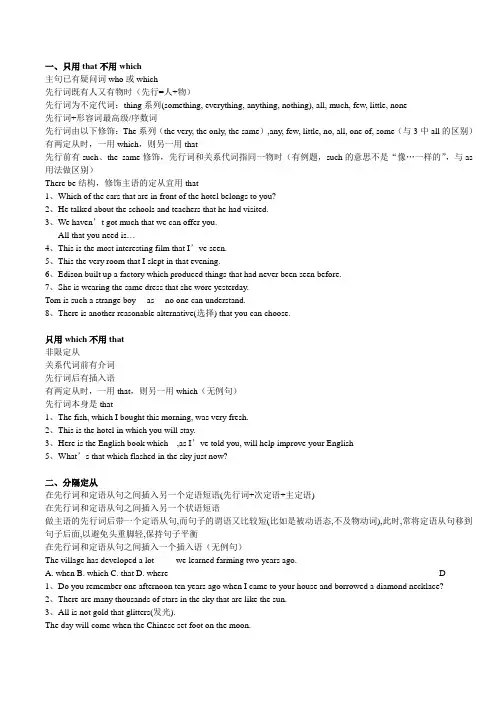
一、只用that不用which主句已有疑问词who或which先行词既有人又有物时(先行=人+物)先行词为不定代词:thing系列(something, everything, anything, nothing), all, much, few, little, none先行词+形容词最高级/序数词先行词由以下修饰:The系列(the very, the only, the same),any, few, little, no, all, one of, some(与3中all的区别)有两定从时,一用which,则另一用that先行前有such、the same修饰,先行词和关系代词指同一物时(有例题,such的意思不是“像…一样的”,与as 用法做区别)There be结构,修饰主语的定从宜用that1、Which of the cars that are in front of the hotel belongs to you?2、He talked about the schools and teachers that he had visited.3、We haven’t got much that we can offer you.All that you need is…4、This is the most interesting film that I’ve seen.5、This the very room that I slept in that evening.6、Edison built up a factory which produced things that had never been seen before.7、She is wearing the same dress that she wore yesterday.Tom is such a strange boy __as__ no one can understand.8、There is another reasonable alternative(选择) that you can choose.只用which不用that非限定从关系代词前有介词先行词后有插入语有两定从时,一用that,则另一用which(无例句)先行词本身是that1、The fish, which I bought this morning, was very fresh.2、This is the hotel in which you will stay.3、Here is the English book which ,as I’ve told you, will help improve your English5、What’s that which flashed in the sky just now?二、分隔定从在先行词和定语从句之间插入另一个定语短语(先行词+次定语+主定语)在先行词和定语从句之间插入另一个状语短语做主语的先行词后带一个定语从句,而句子的谓语又比较短(比如是被动语态,不及物动词),此时,常将定语从句移到句子后面,以避免头重脚轻,保持句子平衡在先行词和定语从句之间插入一个插入语(无例句)The village has developed a lot ____ we learned farming two years ago.A. whenB. whichC. thatD. where D1、Do you remember one afternoon ten years ago when I came to your house and borrowed a diamond necklace?2、There are many thousands of stars in the sky that are like the sun.3、All is not gold that glitters(发光).The day will come when the Chinese set foot on the moon.三、介词;关系代词;关系副词;whose1.介词+关系代词(要点:介词的确定)(1)根据介词和定语从句中谓语动词的习惯搭配(2)根据定语从句意思的需要, 此时不但要注意其前的搭配也要注意其后的搭配注意1) 介词后面的关系词不能省略2) that前不能有介词3) (要点2)某些在从句中充当时间,地点或原因状语的“介词+关系词“结构可以同关系副词when,where和why 互换2.介词+which与关系副词在定语从句中, 当先行词是表示时间、地点或原因的名词时, 就要分别用关系副词when, where, why来引导, 在从句中作状语。
定语从句详解+例句
定语从句详解+例句定语从句是英语重点语法之一,几乎每个人在研究英语时都会遇到,也是高考、四级、六级等考试的重点,因此需要系统的掌握和练。
定语从句在英语中经常出现,用于修饰名词或代词,从而可以更加精准地表达意思。
以下是定语从句的详细解释和例句。
一、什么是定语从句定语从句是用来修饰名词或代词,从而使该名词或代词的含义更加精确。
在定语从句中,包含了一个关系代词(that,which,who,whom,whose)或一个关系副词(where,when,why)等。
二、定语从句的种类1. 定义性定语从句定义性定语从句是限制性的定语从句。
它的作用是进一步说明名词的具体内容和范围。
这种定语从句中的关系代词一般用that/who/which。
例:The book which is on the desk is mine. (在桌子上的书是我的。
)2. 非定义性定语从句非定义性定语从句是非限制性的定语从句。
它用来为名词或代词提供附加的描述或补充信息。
这种定语从句中的关系代词一般用which/who。
例:My husband, who is a doctor, is very busy. (我丈夫是个医生,非常忙。
)三、定语从句的引导词1. 关系代词关系代词包括 that、which、who、whom、whose。
指物指人主格 which who宾格 which/ that whom/who形容词性物主代词 whose whose2. 关系副词关系副词有三个,分别是 when、where 和 why,表示时间、地点和原因。
四、定语从句的位置定语从句通常紧跟在它所修饰的名词之后,用于对该名词进行限制或描述。
五、注意点1. 先行词需要同定语从句中的关系代词在性、数上保持一致。
2. 当先行词在定语从句中作为主语时,关系代词要使用主格形式 who 或者 that。
若先行词在定语从句中作为宾语,关系代词要使用宾格形式 whom 或者 that。
定语从句详解+例句(精品)
定语从句详解+例句一、定语从句及相关术语1.定语从句:修饰一个名词或代词的从句称为定语从句,一般紧跟在它所修饰的先行词后面。
2.关系词:引导定语从句的关联词成为关系词关系词有关系代词和关系副词。
关系代词有that, which, who, whom, whose, as 等;关系副词有where, when, why等。
关系词常有3个作用:1,引导定语从句。
2,代替先行词。
3,在定语从句中担当一个成分。
二.关系代词引导的定语从句1.who指人,在从句中做主语(1) The boys who are playing football are from Class One.(2) Yesterday I helped an old man who lost his way.2. whom指人,在定语从句中充当宾语,常可省略。
(1) Mr. Liu is the person (whom) you talked about on the bus.(2) Mr. Ling is just the boy whom I want to see.注意:关系代词whom在口语和非正式语体中常用who代替,可省略。
(3) The man who/whom you met just now is my friend.3. which指物,在定语从句中做主语或者宾语,做宾语时可省略(1) Football is a game which is liked by most boys.(2) This is the pen (which) he bought yesterday.4. that指人时,相当于who 或者whom;指物时,相当于which。
在宾语从句中做主语或者宾语,做宾语时可省略。
(5) The number of the people that/who come to visit the city each year rises one million.(6) Where is the man that/whom I saw this morning?5. whose通常指人,也可指物,在定语从句中做定语(1) He has a friend whose father is a doctor.(2) I once lived in a house whose roof has fallen in.whose指物时,常用以下结构来代替(3) The classroom whose door is broken will soon be repaired.(4) The classroom the door of which is broken will soon be repaired.(5) Do you like the book whose cover is yellow?(6) Do you like the book the color of which is yellow?三.介词+关系代词引导的定语从句关系代词在定语从句中做介词宾语时,从句常由介词+关系代词引导(1) The school (that/which) he once studied in is very famous.(2) The school in which he once studied is very famous.(3) Tomorrow I will bring here a magazine (that/which) you asked for.(4) Tomorrow I will bring here a magazine for which you asked.(5) We'll go to hear the famous singer (whom/that/who) we have often talked about.(6) We'll go to hear the famous singer about whom we have often talked.注意:1. 含有介词的动词短语一般不拆开使用,如:look for, look after, take care of等(1) This is the watch which/that I am looking for. (T)(2) This is the watch for which I am looking. (F)2. 若介词放在关系代词前,关系代词指人时用whom,不可用who或者that;指物时用which,不能用that;关系代词是所有格时用whose(1) The man with whom you talked is my friend. (T)(2) The man who/that you talked with is my friend. (F)(3) The plane in which we flew to Canada is very comfortable. (T)(4) The plane in that we flew in to Canada is very comfortable. (F)3.“介词+关系代词”前可有some, any, none, both, all, neither, most, each, few等代词或者数词(1) He loved his parents deeply, both of whom are very kind to him.(2) In the basket there are quite many apples, some of which have gone bad.(3) There are forty students in our class in all, most of whom are from big cities.四.关系副词引导的定语从句1. when指时间,在定语从句中做时间状语(1) I still remember the day when I first came to the school.(2) The time when we got together finally came.2. where指地点,在定语从句中做地点状语(1) Shanghai is the city where I was born.(2) The house where I lived ten years ago has been pulled down.3. why指原因,在定语从句中做原因状语(1) Please tell me the reason why you missed the plane.(2) I don't know the reason why he looks unhappy today.注意:关系副词引导的从句可以由“介词+关系代词”引导的从句替换(1) The reason why/ for which he refused the invitation is not clear,(2) From the year when/in which he was going to school he began to know what he wanted when he grew up.(3) Great changes have taken place in the city in which/where I was born.五.限制性定语从句和非限制性定语从句限制性定语从句举例:(1) The teacher told me that Tom was the only person that I could depend on.(2) China is a country which has a long history.非限制性定语从句举例:(1) His mother, who loves him very much, is strict with him.(2) China, which was founded in 1949, is becoming more and more powerful.要注意区分以下几个句子的不同(1) His brother who is now a doctor always encourages him to go to college.他那当医生的哥哥常鼓励他要考上大学。
定语从句例句及讲解
定语从句例句及讲解 定语从句,⼀个简单句跟在⼀名词或代词后(先⾏词)进⾏修饰限定,就叫做定语从句。
下⾯是店铺为⼤家提供的定语从句的例句及讲解,内容如下: 定语从句由关系代词who、whom、whose、which、what、as和关系副词where、when、why等引导,但须记住: 1.what不能引导定语从句. 2.关系词的分析须考虑它在定语从句中的成分。
⼀.指⼈的关系代词有who、whose、whom、that. 试分析: The old man who/whom /that we visited yesterday is a famous artist. Miss Wang is taking care of the child whose parents have gone to Beijing . The man with whom my father shook hands just now is our headmaster. (=The man who/whom that my father shook hands with just now is our headmaster.)注: A. 指⼈时有时只⽤who不宜⽤that。
1.先⾏词为one、ones或anyone (1)The comrade I want to learn from is the one who studies hard and works hard. (2)Anyone who breaks the law should be punished. 2.先⾏词为these时 These who are going to Beijing are the best students of our school. 3.在there be 开头的句⼦中 There is a student who wants to see you. 4.⼀个句⼦中带有两个定语从句,其中⼀个定语从句的关系代词是that,另⼀个宜⽤who,以免重复。
英语定语从句例句
英语定语从句例句定语从句指一个句子跟在先行词后进行修饰限定。
例如:I know the girl who you met. 我认识你遇见的这个女孩。
girl是先行词,who you met是修饰的从句。
第一种:关系代词引导的定语从句关系代词所代替的先行词是人或物的名词或代词,并在句中充当主语、宾语、表语等成分。
关系代词在定语从句中作主语时,从句谓语动词的人称和数要和先行词保持一致。
1)who, whom, that这些词代替的先行词是人的名词或代词,在从句中所起作用如下:Is he the man who/that wants to see you?他就是想见你的人吗?(who/that在从句中作主语)He is the man whom/ that I saw yesterday.他就是我昨天见的那个人。
(whom/that在从句中作宾语)2) Whose 用来指人或物,(只用作定语, 若指物,它还可以同of which 互换), 例如:They rushed over to help the man whose car had broken down.那人车坏了,大家都跑过去帮忙。
Please pass me the book whose cover is green.=Please pass me the book the cover of which is green.请递给我那本绿皮的书。
3)which, that它们所代替的先行词是事物的名词或代词,在从句中可作主语、宾语等,例如:A prosperity which / that has never been seen before appears in the countryside.农村出现了前所未有的繁荣。
(which / that在从句中作主语)The package which / that you are carrying is about to come unwrapped.你拿的包快散了。
- 1、下载文档前请自行甄别文档内容的完整性,平台不提供额外的编辑、内容补充、找答案等附加服务。
- 2、"仅部分预览"的文档,不可在线预览部分如存在完整性等问题,可反馈申请退款(可完整预览的文档不适用该条件!)。
- 3、如文档侵犯您的权益,请联系客服反馈,我们会尽快为您处理(人工客服工作时间:9:00-18:30)。
Attributive Clause 定语从句一、定义定语从句:修饰名词或代词的从句。
换句话说,名词、代词后的从句叫定语从句。
先行词:被定语从句修饰的名词、代词、甚至词组或句子叫先行词。
关系词:引导定语从句的词叫关系词。
1关系代词:在定语从句中担任主、宾、表、定语成分2关系副词:在定语从句中担任状语成分关系词3 个功能:1.连接功能(连接先行词与定语从句);2.担任功能(在定语从句中担任主、宾、表、定、状语);3.替代功能(在定语从句中代替先行词)。
关系代词在定语从句中充当主语的是:who, that, which, as宾语的是:who, whom, that, which, as定语的是:whose, which先行词是人时,关系代词是:先行词是物时,关系代词是:who, whom, that, as which, that, whose, as关系副词有:关系副词=when ( 先行词为时间介词 + which / whom), where (先行词为地点), why (先行词为原因)定语从句分为两种:限制性与非限制性。
先行词与关系词之间无逗号隔开为限制性;有逗号隔开则为非限制性,且一般由 which 引导。
唯一可以置于先行词之前的定语从句由关系代词as引导。
二、关系代词引导的定语从句1.who 指人,在从句中做主语(1)The boys who are playing football are from Class One.(2)Yesterday I helped an old man who lost his way.2.whom 指人,在定语从句中充当宾语,常可省略。
(1)Mr. Liu is the person (whom) you talked about on the bus.(2)Mr. Ling is just the boy whom I want to see.注意:关系代词whom 在口语和非正式语体中常用who 代替,可省略。
(3) The man who/whom you met just now is my friend.3.which 指物,在定语从句中做主语或者宾语,做宾语时可省略(1)Football is a game which is liked by most boys.(2)This is the pen (which) he bought yesterday.4.that 指人时,相当于 who 或者 whom ;指物时,相当于 which 。
在宾语从句中做主语或者宾语,做宾语时可省略。
(5)The number of the people that/who come to visit the city each year rises one million.(6)Where is the man that/whom I saw this morning?5.whose 通常指人,也可指物,在定语从句中做定语,有从属关系。
(1)He has a friend whose father is a doctor.(2)I once lived in a house whose roof has fallen in.whose 指物时,常用以下结构来代替(3)The classroom whose door is broken will soon be repaired.(4)The classroom the door of which is broken will soon be repaired.(5)Do you like the book whose cover is yellow?(6)Do you like the book the color of which is yellow?三、介词 +关系代词引导的定语从句关系代词在定语从句中做介词宾语时,从句常由介词+关系代词引导(1)The school (that/which) he once studied in is very famous.(2)The school in which he once studied is very famous.(3)Tomorrow I will bring here a magazine (that/which) you asked for.(4)Tomorrow I will bring here a magazine for which you asked.(5)We’ll go to hear the famous singer (whom/that/who) we have often talked about.(6)We’ll go to hear the famous singer about whom we have often talked.注意: 1. 含有介词的动词短语一般不拆开使用,如:look for, look after, take care of等(1)This is the watch which/that I am looking for. (T)(2)This is the watch for which I am looking. (F)which ,2. 若介词放在关系代词前,关系代词指人时用whom ,不可用 who 或者 that;指物时用不能用 that;关系代词是所有格时用whose(1)The man with whom you talked is my friend. (T)(2)The man who/that you talked with is my friend. (F)(3)The plane in which we flew to Canada is very comfortable. (T)(4)The plane in that we flew in to Canada is very comfortable. (F)3.“介词 +关系代词” 前可有 some, any, none, both, all, neither, most, each, few 等代词或者数词(1)He loved his parents deeply, both of whom are very kind to him.(2)In the basket there are quite many apples, some of which have gone bad.(3)There are forty students in our class in all, most of whom are from big cities.四、关系副词引导的定语从句1.when 指时间,在定语从句中做时间状语(1)I still remember the day when I first came to the school.(2)The time when we got together finally came.2.where 指地点,在定语从句中做地点状语(1)Shanghai is the city where I was born.(2)The house where I lived ten years ago has been pulled down.3. why 指原因,在定语从句中做原因状语(1)Please tell me the reason why you missed the plane.(2)I don ’tknow the reason why he looks unhappy today.注意:关系副词引导的从句可以由“介词+关系代词”引导的从句替换(1)The reason why/ for which he refused the invitation is not clear,(2)From the year when/in which he was going to school he began to know what he wanted when he grew up.(3)Great changes have taken place in the city in which/where I was born.难点分析(一)只能用that不用which1.当先行词是anything, everything, nothing (something除外), few, all, none, little, some等代词时,或者是由every, any, all, some, no, little, few, much等修饰时(1)Have you taken down everything that Mr. Li has said?(2)There seems to be nothing that seems impossible for him in the world.(3)All that can be done has been done.(4)There is little that I can do for you.注意:当先行词指人时,偶尔也可以用who(4)Any man that/who has a sense of duty won ’tdo such a thing.2. 当先行词被序数词修饰(1)The first place that they visited in London was the Big Ben.3. 当先行词被形容词最高级修饰时(1) This is the best film that I have seen.4. 当形容词被the very, the only, the last 修饰时(1)This is the very dictionary that I want to buy,(2)After the fire in his house, the old car is the only thing that he owned.当先行词指人时,偶尔也可以用who(3)Wang Hua is the only person in our school who will attend the meeting.5. 当先行词前面有 who, which 等疑问代词时(1)Who is the man that is standing there?(2)Which is the T-shirt that fits me most?6. 当先行词既有人,也有动物或者物体时(1) Can you remember the scientist and his theory that we have learned?只能用 which, who, whom 不用 that1.关系代词直接放在介词后面时,要用which ,不用 that;要用 whom ,不用 who 。
